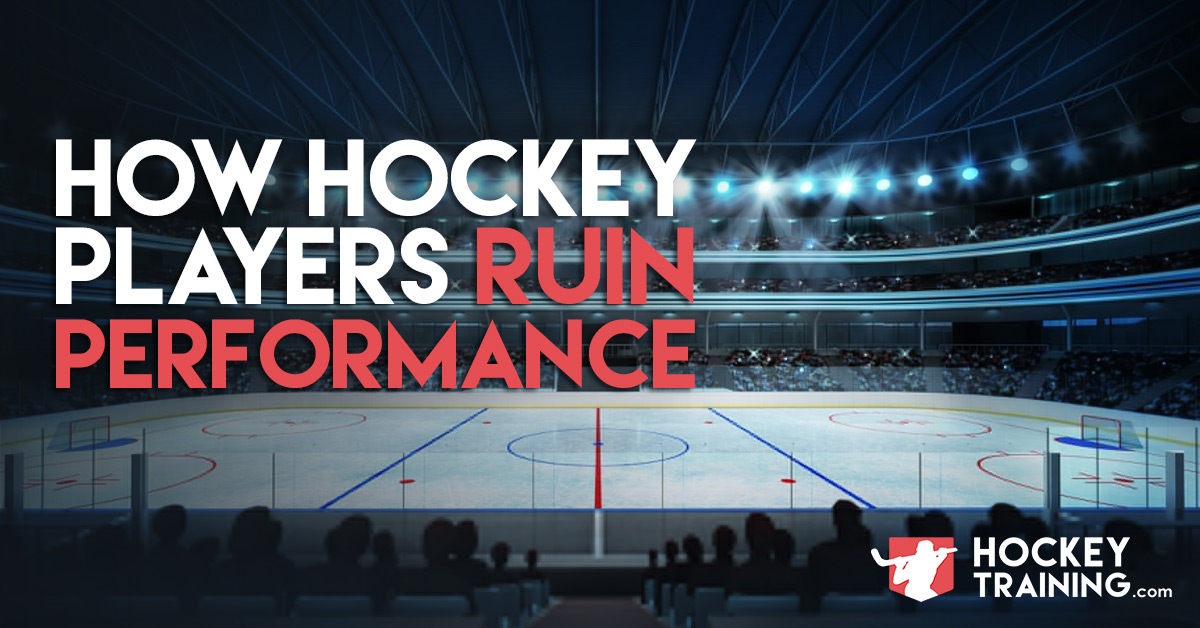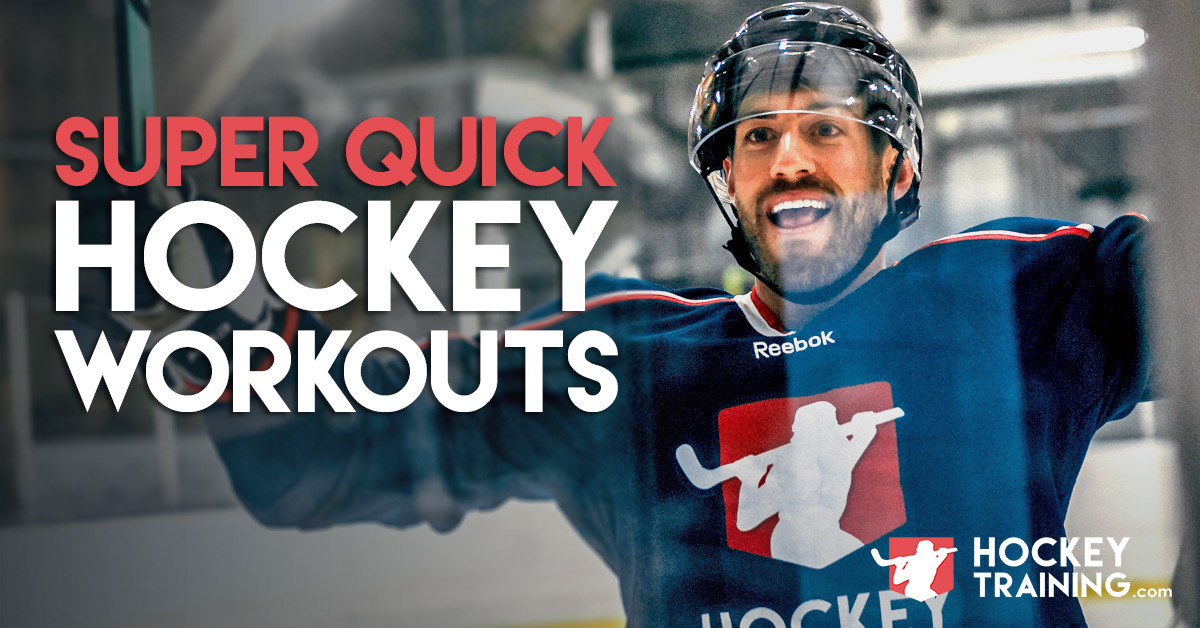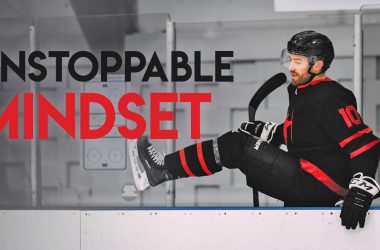Whether you like it or not, accomplishing goals in any area of life and being able to build even further upon those goals has everything to do with your ability to control emotions.
Meaning, tapping into the emotions that serve you – and not allowing the self-sabotaging and useless emotions take you off track from where you want to be.
Make no mistake about it – the best hockey players on this planet are masters at using their emotions strategically and never allowing themselves to be used by their emotions.
You might want to get faster, burn fat, improve your all-around hockey performance, or become captain this year – all of these goals stretch your comfort zone, and anytime you stretch your comfort zone you run the risk of wanting to run back to what is comfortable rather than what is right.
Risk will always invite emotion, and emotion will oftentimes seek comfort as opposed to change – even if the change is something you know will be better for you in the long-term.
Our emotions are trained through evolution in many ways to keep us comfortable because back in the old days comfort meant we were going to live another day.
But in modern times, comfort is in many cases the exact opposite of what will allow us to progress as athletes and as people.
Don’t mistake comfort for happiness – progress is uncomfortable, and it’s immature to think that it shouldn’t be. If you want to play the game, then pay the price.
Avoiding the Landmines
Research is very clear in demonstrating that our minds find it much easier to connect to negative emotions, especially in times of risk or crisis.
Again, this is an evolutionary effect that helped us greatly when we needed to survive as a species. If we remember the bad, we can avoid it in the future and therefore remain comfortable avoiding what we perceived as danger.
Unfortunately, when it comes to you achieving your long-term goals in this sport, connecting to your negative emotions is one of the fastest ways to fail.
Imagine for a moment that your goal this year is to be the captain of your team or the highest goal scorer…
Do you really think you can accomplish and sustain such a goal if it means connecting with anger, frustration, jealousy, fear, and anxiety throughout the process of getting there?
And even if you do…do you think you can stay there while bringing all of this baggage with you?
This will never work.
Learning from The Greats
If you study a cross-section of the highest achievers from as many fields as you can (not just professional athletics) – you will find that one of the greatest consistencies between them all is their ability to control their emotions.
They control emotion – they do not allow emotion to control them.
This isn’t to be misrepresented as being emotionless either because using emotion properly and efficiently where it counts can be a serious asset to you. But the key is being in control of the process. Those who allow emotions to control them end up right where they started. Emotion left unchecked is just as deadly as a wildfire.
For example – a campfire can be a great thing because it can cook your food, keep you warm, and bring you a light in the darkness. But if it isn’t managed properly, it can burn you and the entire forest down.
Emotions are the same way.
When managed properly, they are valuable tools. When left unmanaged, they can get out of control – and they can get out of control quite quickly as well. Just like a wildfire.
The name of the game is taking ownership of how you feel and being responsible for the actions you take using those feelings moving forward.
Again, do not ignore how you feel and play the emotionless card – it will have the same result as ignoring your campfire. Sooner or later you will be forced to recognize what you’re left to deal with.
What you feel is real, so embrace it. But at the same time, you can’t indulge every emotion you have either.
Take a moment, learn from them, and ask yourself if this particular emotion is serving you or working against you.
In the same light, you can ask yourself if fully indulging in this emotion will move you closer to your goal or further away from it.
We all react differently, so you need to ask these questions yourself knowing how you best operate with that emotion inside you.
Listen Carefully
Being informed by your current emotion is one thing, allowing it to dominate your thought patterns is another.
When it comes to creating hockey excellence in your life, you need to implement a mindset that examines emotion rather than reacts to it. This way you can use what’s good to energize you and move you in the right direction with both emotion and logical thought.
Check-in with yourself monthly, weekly, and even daily throughout your life and throughout your process trying to achieve these goals because the reality is that all kinds of emotions are going to pop up and it’s your job to notice and acknowledge them so you can either work around them or use them as fuel.
To put it another way, you need to check in on the campfire so that you can manage it properly and use it to your advantage.
When things like anger and anxiety get the better of you, they will also bring out the worst in you. Bring your worst self to the table is no way to achieve your short or long-term goals.
The key questions you have to ask yourself are…
Do I have control?
Does my emotional agenda match my logical thinking agenda?
Does my emotional self work for or against my self-discipline?
Answering these thoughtfully and honestly will take you in the right direction towards finding the alignment you need within yourself before you can ever accomplish something in the real world.
Once you conquer your inside world, you will be able to conquer your outside world.
Forget the Past
The past holds plenty of unwanted and self-sabotaging feelings for you. Maybe we missed an open net, maybe we threw a blind pass up the center only to give it right to the other team to score, or maybe you just straight up scored on your own net.
We’ve seen this happen to someone else before, I’m also betting you have experienced it yourself. But you can’t take this with you moving forward or else it will be an anchor on every one of your future attempts.
You are presented with an opportunity to show what you’re made of, but since you “screwed up” in the past, you are haunted by the feelings of embarrassment, anxiety, and fear when the time comes for you to try it over again – especially if there’s an audience.
Look, worrying about a past mistake will only ever lead to you making a present mistake.
You need to forget the “worrying” and start being able to learn from these mistakes. Learn from the past, plan for the future, and act in the present.
Your relentless replaying of what happened in the past only destroys the performance-mindset you need in the present. The past is blinding, and it will prevent you from seeing the opportunity that’s standing right in front of you.
Anxiety has a funny way of living in both the past and the future – but if we just be our authentic selves and not think about the past or the present on the ice, you have no room for doubt or self-sabotage.
As the old saying goes: The best goalies are the ones who have short-term memory loss.
How true is that?
If a goalie stayed “stuck” on each goal they let by – they would be bound to past “failures” forever, even though they weren’t failures at all.
Dominate in the NOW
I’m sure by now you’re thinking that all of this is a great idea…but how does one go about starting to live in the present and be able to control their emotions?
It’s simple, but not easy.
I want you to take forward with you the mindset of hurrying slowly.
Never hurry when it counts, a frantic mind is an irrational mind and this irrational thought is born from reactive emotion. These are the emotions that don’t serve you. These feelings of hurrying are driven by anxiety and nervousness.
You start rushing everything and you get so far ahead of yourself that you make all of the mistakes you were trying to avoid in the first place.
Take a shootout for example – ever notice the most nervous players are the ones who try way too many moves and end up doing nothing?
Whereas the players who every goalie fears during a shootout are the ones who move to the net nice and slow with perfect calculations and end up ripping one in the top corner?
This is hurrying slowly.
Hurrying slowly is the athlete’s ability to inject a calm energy into an environment that seems chaotic. It’s a calm-energy that is the antidote to racing thoughts and impulsive behaviors.
Hurrying slowly keeps you moving at the pace you need to be moving at – but allows you to only live in the present and utilize the emotions and thought patterns that serve you.
Hurrying slowly is how you stay grounded during overtime in game 7 of the series.
Hurrying slowly moves you forward towards your goal in a way that aligns your character, your rational thought, and your emotions all in the same direction. This makes you unstoppable.
Final Thoughts
If you want to be the best version of yourself you can possibly be in this sport, you’re going to need to bring a lot of passion to the table.
Passion is the positive emotional foundation that you can lean on for all achievements and accomplishments. If you can’t always be passionate about what you’re doing, then be passionate about who you are while you’re doing it.
Do you think following a nutrition plan “sucks”?
Do you think conditioning day is “too hard”?
Are you just “too busy” to train today?
I don’t care – you don’t have to be passionate about what you’re doing, but you have to be passionate about who you are while you’re doing it. Don’t commit to the diet, don’t commit to the training, and don’t commit to the schedule – commit to yourself.
Any kind of commitment to a serious goal in hockey will eventually become tedious at times. Boo-hoo, that’s life buddy.
Your excitement might wear off at times – then what? Are you going to quit?
No.
Only people who commit to training programs or diets quit at this point – the hockey athletes who persevere are the athletes who are committed to themselves.
You should be saying things like:
“I’m not the kind of person who cheats on my diet, misses a training session, or doesn’t come prepared – this only cheats myself, and I have more self-respect than that”
This is how you build real discipline.
It’s not about committing to your program, it’s about being the person you need to be in order to achieve what you want to achieve in life.
This blog entry is filled with ways to start taking control of your emotions, and when you take control of your emotions you start taking control of your entire life.
Self-control leads to self-discipline, and self-discipline leads to self-mastery.
Ready to get started with one of our hockey training programs and take your speed, skills, and performance to a whole new level? Tap here to see which program is best for you.










Coach, awesome article. One that I’ll no doubt come back to read more than once.
Great article very useful in both hockey and in life will share with our team
Great points for playing hockey and the game of “life”